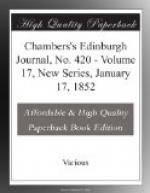Indefatigable in the discharge of his interesting duties, Mr Jackson speedily obtained the confidence of his military superiors, who remarked with admiration not only his intelligent zeal in performing his hospital functions, but his calmness, quickness of perception, and generous self-devotion when in the field of battle. On one occasion, although suffering at the time from severe indisposition, he remained, under a heavy fire, succouring the wounded, in spite of the remonstrances of the officers present. On another, having observed the British commander, Colonel (afterwards General) Tarleton, in danger of falling into the hands of the enemy, who had routed the royalist troops, he galloped up to the colonel—whom a musket-ball had just dismounted—pressed him to mount his own horse and escape, whilst he himself, with a white handkerchief displayed, quietly proceeded in the direction of the advancing foe, and surrendered himself at once. The American commander, who did not know what to make of such conduct, asked him who he was? He replied: ’I am assistant-surgeon in the 71st regiment. Many of the men are wounded, and in your hands. I come, therefore, to offer my services in attending them.’ He was accordingly sent to the rear as a prisoner; but was well treated, and spent the first night of his captivity in dressing his soldiers’ wounds, taking off his shirt, and tearing it up into bandages for the purpose. He afterwards did the same good office for the American sufferers; and when the wounded English could be exchanged, Washington sent him back, not only without exchange, but even without requiring his parole. At a subsequent period during the same unhappy war, when the British under Lord Cornwallis were in full retreat, the sick and wounded were placed in a building which the colonists, on their approach, began to riddle with shot. Several surgeons, not caring to incur the risk of entering so exposed an edifice, agreed to cast lots who should go in and see to the invalids; but Jackson, with characteristic nerve and simplicity, at once stepped forward: ’No, no,’ said he, ‘I will go and attend to the men!’ He did so, and returned unhurt.
After this we find him a prisoner in the hands of the Americans and French at New York Town, Virginia. As on the former occasion, he was treated with all imaginable kindness; and, being released on parole, returned to Europe early in 1782, and proceeded by way of Cork, Dublin, and Greenock to Edinburgh, where he abode for a short time. Thence he started for London; and, desirous of testing the best way of sustaining physical strength during long marches, and urged perhaps also by economical considerations, he resolved to make the journey on foot. His West Indian and American experience had taught him that spare diet consisted best with pedestrian efficiency, and it was accordingly his practice, during this long walk, to abstain from animal food until the close of day, nor often then to partake of it. He would




